#matt ruff
Explore tagged Tumblr posts
Text
I want an Oz adaptation in the vein of Lovecraft Country, challenging the rabid racism of an author whose work has shaped the face of American pop culture. Because L. Frank Baum, HOO BOY.
Okay there's The Wiz, but my impression (admittedly secondhand; I really want to see that play, but correct me if I'm wrong) is that challenging the racism of the story's original creator isn't the focus the way it is in Lovecraft Country. I want Native Dorothy (going by her home state of Kansas, she'd presumably be from one of the Plains cultures that Baum wanted dead) and transfem Black Ozma as an official couple. I would write this, but I already have so many ideas and honestly I should probably leave it to someone who's Indigenous or Black themselves.
#writeblr#oz#the wizard of oz#the wonderful wizard of oz#land of oz#l frank baum#l. frank baum#dorothy gale#ozma#lovecraft country#jordan peele#matt ruff
47 notes
·
View notes
Text
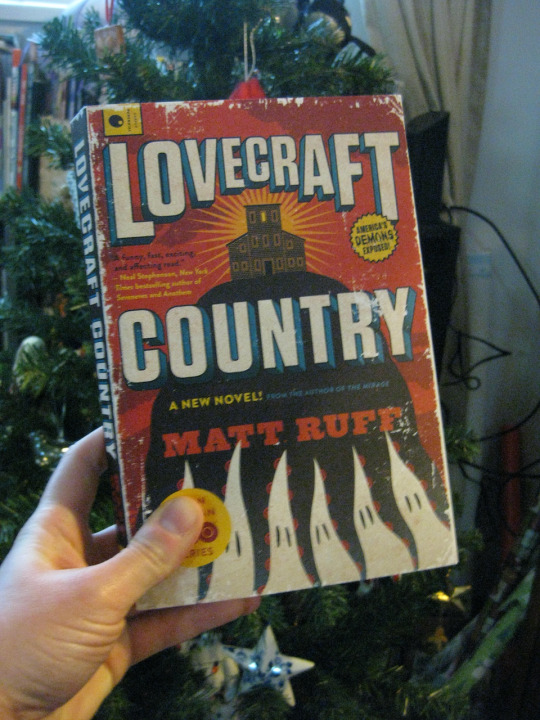
This month's last-minute review is brought to you by something of a reading slump. I've read a fair number of good books this month, if you look at the ratings I've given them, but no books that I've gotten excited about, that I've felt were unexpectedly good enough that I had to talk about it.
Until now.
Lovecraft Country was my first Matt Ruff, and it's not going to be the last. It's well-written, with strong characters and good humour, and a really interesting structure. It's a smart book, and feels very grounded and real. Is it an astounding book? No, but it does its thing very well and I enjoyed reading it more than I thought I would.
Let's start with the structure, because that's one of the things that impressed me most. It's a novel-of-stories, with each chapter being a different character on their own adventure, but there's still a narrative arc for the book, clues the characters gather and the readers pick up on, and nastiness that builds and builds until the final showdown. It's a tough structure to pull off, but Ruff's done it.
I also liked that the structure lent itself very well to a sort of puzzle-box story. You get all these clues and hints about what's truly going on, even if you don't realize that till later, and even though you kind of know where the book is going, watching everything slowly slot into place and trying to put everything together before the characters do is a good part of the fun. It's a lot like watching good SFnal TV, which Ruff's author's note says this was meant to be; you get invested in the characters and the individual "episodes", but there's meaning in that key, that comic book, that thing in the forest. Surely there must be, but how?
And the characters! I loved all the point-of-view characters—they're smart, opinionated, complicated, aware of the forces acting against them and doing what they can to avoid them. I was scared for them, I wanted them to succeed, all that good stuff. The white people are also believably drawn, in that they're self-important, greedy, and used to power, but also, when the story allows for us to see it, sympathetic and complicated all the same.
It's hard to say whether this is science fiction or fantasy, but it's definitely in that wheelhouse rather than being a straight-up historical novel. There are ghosts and monsters and grimoires and secret dimensions and a lot of other stuff you might expect to find in a book that's influenced by pulp fiction and early sci-fi and horror. But, as with a lot of genre work that tackles such things these days, Ruff has fun with this stuff while also adding a social twist to them. In this case, having a Black cast allows Ruff to illuminate and comment on the racism inherit to the 1950s. There's humour to it, but in a way that helps the points hit home.
And that brings me to the last thing I need to mention: that this is a book about Black people written by a white man. It's also written primarily for white people, as far as I can tell, because while the characters take redlining and sundown towns for granted, Ruff doesn't assume that his readers will even know what those are or, if they do, be aware how they actually impact people. However, Ruff's also done his research and tackled the subject thoughtfully. The characters don't conform to stereotypes but are definitely informed by their pasts. The stuff they face goes beyond the usual talking points of Black History For White People; there's mention of boycotts of racist businesses, the Tulsa race massacre, the intricacies of buying real estate while Black, the difficulties of loving science fiction when everyone who writes it hates you. And of course he acknowledges that dealing with racist BS on a daily basis and constantly being underestimated puts you at an advantage when there's some really massive BS going down. I thought Ruff handled it all very well, without being heavy-handed or going into anything that he couldn't do justice. (Well, maybe Ruby's story. I need to think about that one more.)
So yeah, I was surprised by this book on a few fronts, and I enjoyed it more than I thought I would. The humour and love of SF tropes, balanced with the antiracism and social commentary, was right up my alley, and the way Ruff told the story was the cherry on top. Like I said, it's not an amazing book—it might have pushed the boundaries of speculative fiction when it came out but it certainly doesn't now—but it entertains and enlightens and does so cleverly. This won't be my last Matt Ruff, like I said above, but I'm also not likely to pick up another one for a while. Maybe in a year or two when I get a hankering for the sort of stuff he does.
#book reviews#booklr#bookblr#speculative fiction#adult booklr#book photography#read in 2023#Lovecraft Country#Matt Ruff#book recommendations#my photos
27 notes
·
View notes
Text
Matt Ruff's "Destroyer of Worlds"
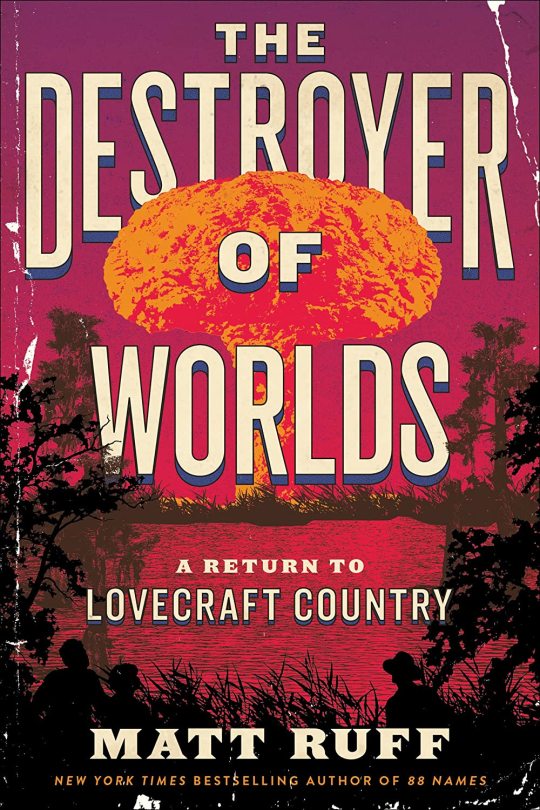
In Lovecraft Country, Matt Ruff pulled off a genius inversion: retelling the racist horror tales of HP Lovecraft in reverse, from the perspective of the Black people whom Lovecraft so viciously loathed, casting as villains the white supremacist sorcerers whom Lovecraft turned into heroes:
https://memex.craphound.com/2016/02/16/matt-ruffs-lovecraft-country-where-the-horror-is-racism-not-racist/
If you’d like an essay-formatted version of this post to read or share, here’s a link to it on pluralistic.net, my surveillance-free, ad-free, tracker-free blog:
https://pluralistic.net/2023/02/21/the-horror-of-white-magic/#anti-lovecraftian
Country was adapted by Jordan Peele into a spectacular TV serial — no mean feat, given how much of Ruff’s brilliant characterizations relies on the novelist’s trick of giving readers direct access to characters’ thoughts and internal states, something that is off-limits to screen adaptations without recourse to cheap tricks like voice-overs.
Today, Harpercollins releases The Destroyer of Worlds, a spectacular followup to Country that revisits the characters, setting, and supernatural dread of the original:
https://www.harpercollins.com/products/the-destroyer-of-worlds-matt-ruff?variant=40490768957474
Country was structured as a series of linked novellas, each one picking up where the previous left off, with a different focal characters. Destroyer is a much more traditional braided novel, moving swiftly amongst the characters and periodically jumping back in time to the era of American slavery, retelling the story of the settlement of the Great Dismal swamp by escaped slaves:
https://en.wikipedia.org/wiki/Great_Dismal_Swamp_maroons
Few writers can manage a cast of characters this large with Ruff’s deft hand — they are likable, individual, and we root for all of them as they strive to save themselves from the eldritch forces that can only be temporarily vanquished.
It makes for an extremely fast-paced, high-stakes read, as we ping-pong around the Jim Crow south and all the way to the end of the universe. The white sorcerers of Country are still in the frame, as ghosts and exiles — a parable for the tireless nature of white supremacist hatred, and of the festering sores on the American body politic that have suppurated and multiplied in the absence of cleansing truth and reconciliation.
HP Lovecraft was a gifted writer, but he was not a good person. Even by the standards of his day, his racism was particularly vicious, and Lovecraft mixed that viciousness with his prodigious talents to paint the targets of his loathing in the most visceral, cruel light. It was so ugly that even Robert E Howard lectured him about it:
https://web.archive.org/web/20140701000000/http://read.barretta.cc/post/89727018274/you-express-amazement-at-my-statement-that
“People claiming to possess superior civilization have always veneered their … looting, butchering and plundering… by [claims] of art, progress and culture.”
And yet, Lovecraft’s work made a substantial, undeniable mark on the field, and the literary techniques he invented, advanced and/or perfected are woven into our literature. Rather than deny this influence, some of the field’s best writers have sought to redeem it, wresting Lovecraftian techniques from Lovecraftian ideology.
Ruff is part of that tradition, but by no means all of it. 2019 saw the publication of NK Jemisin’s stunning The City We Became, an anti-racist Lovecraftian tale in which New York City’s glorious riot of race, color, language and viewpoint is set to be devoured by a conservatisizing, homogenizing eldritch power from another universe:
https://pluralistic.net/2021/01/09/the-old-crow-is-getting-slow/#i-love-ny
Exicitingly, City We Became now has a sequel, The World We Make, which has gotten rave reviews:
https://www.hachettebookgroup.com/titles/n-k-jemisin/the-world-we-make/9780316509893/
The literature of anti-racist, anti-fascist Lovecraftian horror is a broad and exciting one, including RPGs:
https://www.kickstarter.com/projects/1122788890/lovecraftesque/description
And David Nickle’s essential duology, Eutopia (2011):
https://boingboing.net/2015/03/10/eutopia-horror-novel-about-lo.html
and Volk (2017):
https://memex.craphound.com/2017/10/11/volk-a-sinister-lovecraftian-tale-of-eugenics-naziism-and-radiant-abomination/
Nickle has written well and extensively about Lovecraftian horror and race:
http://davidnickle.ca/dont-mention-the-war-some-thoughts-on-h-p-lovecraft-and-race/
And the last word on Lovecraft scholarship is certainly Les Klinger’s The New, Annotated HP Lovecraft (2014)
https://wwnorton.com/books/9780871404534
Attentive readers will recall that Klinger is the Sherlockian attorney who successfully defeated the Doyle estate’s copyfraud claims that the Sherlock Holmes stories were still in copyright:
https://pluralistic.net/2022/12/20/free-for-2023/#oy-canada
The benefits from the works of Doyle, Lovecraft, and all other authors eventually return to the public domain is neatly illustrated in this new Lovecraftian creativity. If Lovecraft had to stand alone, uninterpreted and unrebutted, we would lose his brilliance along with his wickedness. But because Lovecraft now belongs to all of us, he can be reworked, challenged, argued over, problematized, and preserved, even if he can never be redeemed.
[Image ID: The cover of Matt Ruff's 'Destroyer of Worlds.']
#pluralistic#matt ruff#horror#science fiction#race#reviews#books#gift guide#green book#lovecraft country
93 notes
·
View notes
Text

✨️📖 A Goodwill Book Haul 📖 ✨️
#books#book stacks#book haul#book photography#Neil Gaiman#Charles Vess#Ross King#Jenny Slate#Matt Ruff#R. H. Sin#Tanya Huff#Not Out of Void But Out of Chaos
56 notes
·
View notes
Text
I'm so chuffed about the latest episode of Our Opinions Are Correct, the podcast I co-host with Annalee Newitz.
We look at the science fiction author who influences Silicon Valley the most: Ayn Rand! How does Rand's gospel of selfishness shape the technology we all use every day? We get deep into Rand's impact on tech, with philosopher Matt Zwolinski and author Matt Ruff.
33 notes
·
View notes
Text


Currently reading Lovecraft Country on my kindle (heavily featuring stickers by @mostlyghostie 🧡)
#got the new stickers today i love them#lovecraft country#kindle#books#stickers#currently reading#matt ruff
21 notes
·
View notes
Text
Have you read...
note: If you did not finish but feel you read enough to form an opinion, you may choose a ‘Yes’ option instead of 'Partly' (e.g., Yes, I didn’t like it). Interpret "neutral or complicated" however you like, I intended this category to be a broad option between like and dislike.

The critically acclaimed cult novelist makes visceral the terrors of life in Jim Crow America and its lingering effects in this brilliant and wondrous work of the imagination that melds historical fiction, pulp noir, and Lovecraftian horror and fantasy. Chicago, 1954. When his father Montrose goes missing, twenty-two year old Army veteran Atticus Turner embarks on a road trip to New England to find him, accompanied by his Uncle George—publisher of The Safe Negro Travel Guide—and his childhood friend Letitia. On their journey to the manor of Mr. Braithwhite—heir to the estate that owned Atticus’s great grandmother—they encounter both mundane terrors of white America and malevolent spirits that seem straight out of the weird tales George devours. (...) A chimerical blend of magic, power, hope, and freedom that stretches across time, touching diverse members of one black family, Lovecraft Country is a devastating kaleidoscopic portrait of racism—the terrifying specter that continues to haunt us today.
submit a horror book!
#lovecraft country#matt ruff#lovecraft#lovecraftian#horror books#horror#bookblr#books#horrorbookpoll
6 notes
·
View notes
Note
What are your top 5 books?
1.

2.
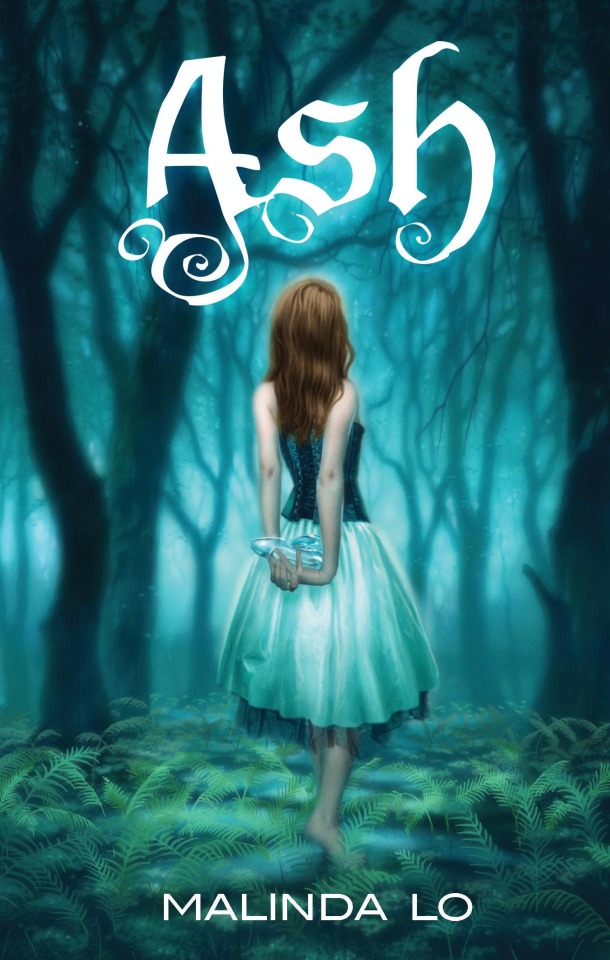
3.
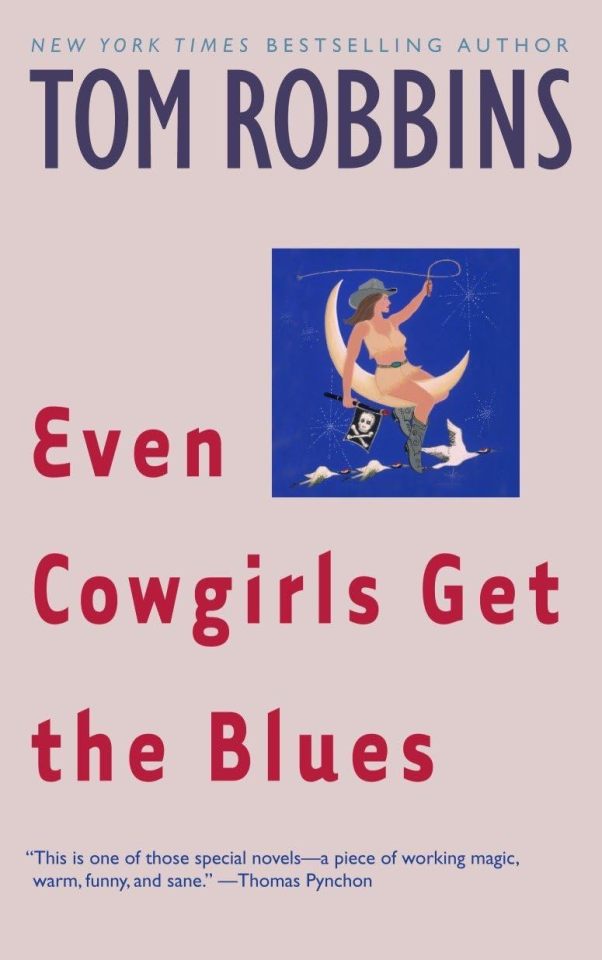
4.

5.

#ask#book#reading#top 5#books#favourite books#anonymous#answered#becky chambers#to be taught if fortunate#malinda lo#ash#tom robbins#even cowgirls get the blues#matt ruff#set this house in order#chuck palahniuk#fight club
8 notes
·
View notes
Text
#adrian tchaikovsky#arkady martine#jason pargin#robert evans#hiron ennes#gareth hanrahan#martha wells#john scalzi#matt ruff#lovecraft country#lords of uncreation#kaiju preservation society#a desolation called peace#a memory called empire#murderbot#the murderbot diaries#children of memory#ogres#the sword defiant#city of second chances#after the revolution#if this book exists you're in the wrong universe#leech
3 notes
·
View notes
Text

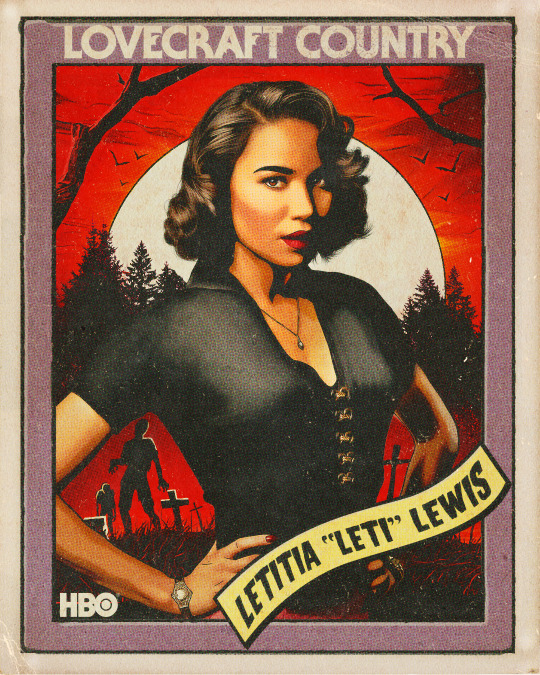
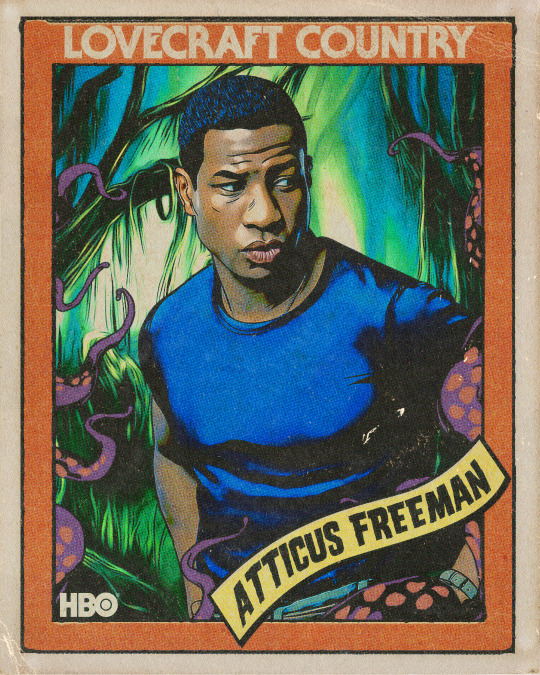
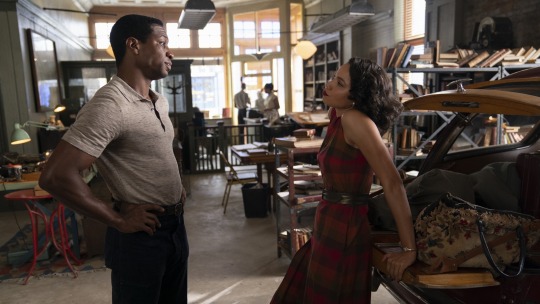



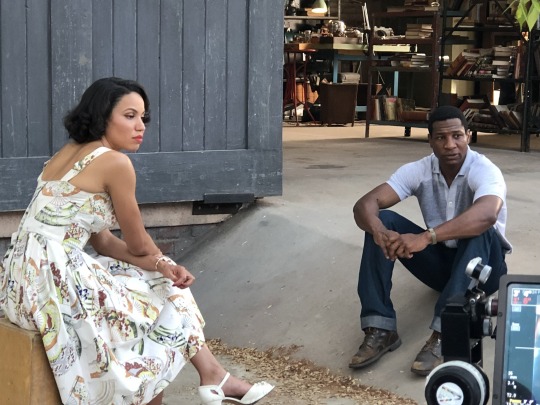
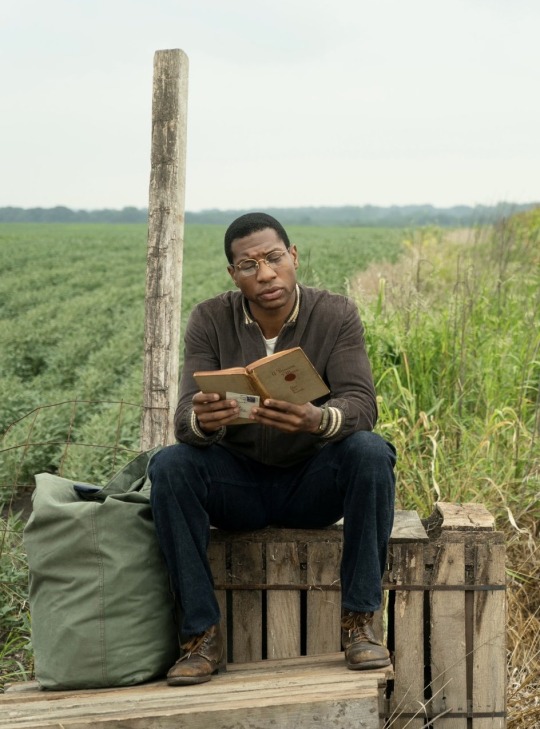

This was such a great show(excluding the ending)!!
#lovecraft country#atticus freeman#jonathan majors#letitia lewis#jurnee smollett#misha green#h.p. lovecraft#matt ruff
6 notes
·
View notes
Text
Lovecraft Country - Matt Ruff
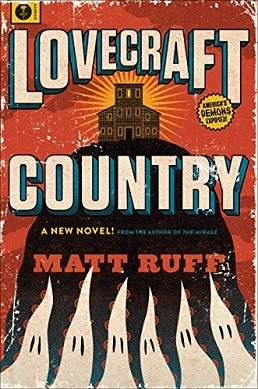
My third attempt to read this book. I don't know why, because I've enjoyed it each time I've tried to read it. It's not the most amazing book by any means, but I love the characters Atticus Turner and Letitia and Ruby Dandridge. I think that books like The Ballad of Black Tom better take the topic of Lovecraft's racism and take it back for African-Americans. I think that story is better written. I sort of wonder if Ruff used Lovecraft name for sales and attention. Here, you pretty much could pick any horror/sci-fi/fantasy author from that time period and get similar results, Lovecraft was just more pronounced in his racism, but Lovecraft's racism doesn't have a lot to do with this particular series of stories. When it touched on Lovecraft subjects I think is when I liked it the most. No surprise there for me, since I enjoy Lovecraft's story ideas. For me, when this book was led by the female characters (Dreams of the Which House/Jekyll in Hyde Park) were when it was the strongest for me and I really loved those sections of the book. Give me a full length novel with Letitia and Ruby and I'd be stoked to read that. As a whole, a series of stories, it was up and down for me. It wasn't ever bad, even at its worst I think Ruff is a talented author, just some of the stories didn't grab me as hard as others.
3/5
#halloween reading 2023#horror#horror fiction#weird fiction#lovecraft#hp lovecraft#lovecraft country#matt ruff#atticus turner#letitia dandridge#ruby dandridge#racism#sci-fi#fantasy#the ballad of black tom#victor lavalle
3 notes
·
View notes
Text
I doubt I'll live to see Twilight enter the public domain, but if I do I would like to see a Lovecraft Country-style take on it that tackles the original series's racism and other issues
#stephenie meyer#twilight#the twilight saga#twilight saga#h. p. lovecraft#h.p. lovecraft#h p lovecraft#hp lovecraft#hpl#lovecraft country#matt ruff#jordan peele
9 notes
·
View notes
Text
Winter Tide by Ruthanna Emrys: A Book Review
New book review At Kathy L. Brown writes The Storytelling Blog: Winter Tide by Ruthanna Emrys. Stylish Cold War Era spy story meets ritual magic and eldritch horror. The Deep Ones side of the Innsmouth Incident.
Winter Tide—The Innsmouth Legacy #1 by Ruthanna Emrys (Tor Dot Com, 2017) I ran across Winter Tide by Ruthanna Emrys as I explored, for my own writing, diverse, modern takes on the problematic Lovecraft mythos. Like many “New Weird” writers, such as Matt Ruff and Victor LaValle, Emrys has turned icky tropes on their heads. Winter Tide places the Lovecraftian Deep Ones at the center of their own…

View On WordPress
#cold war#Deep Ones#Evan J. Peterson#H.P. Lovecraft#horror#Lovecraft#Lovecraft Country#Matt Ruff#mythos#New Weird#Ruthanna Emrys#Shadow over Innsmouth#Tor dot com#urban fantasy#Victor LaValle#weird#winter tide
2 notes
·
View notes
Text
Best books I’ve read so far in 2023. All fantastic!
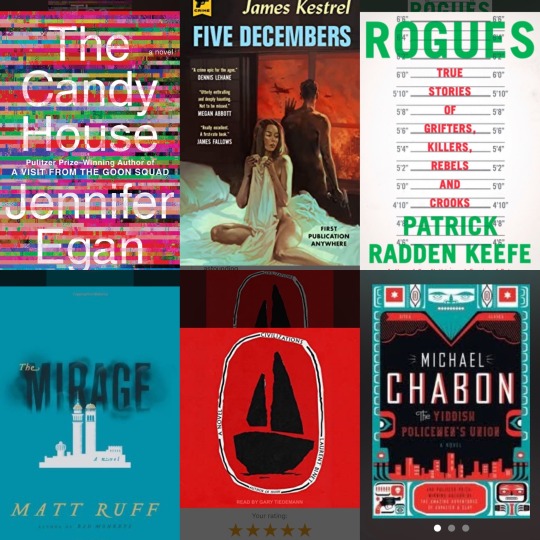
2 notes
·
View notes
Text
Lovecraft Country by Matt Ruff
Ruff acknowledges the parallels between being a human in a world not designed for them and a black person in an openly racist society, creating cosmic horror that neither ignores the racism in Lovecraft’s work nor preaches about it. Continue reading Lovecraft Country by Matt Ruff

View On WordPress
1 note
·
View note
Text
Damn, I missed it
Happy belated catch-up day to one of my favourite works of science fiction, namely the Public Works Trilogy by Matt Ruff.
Written in the 90's, this work takes place in the not particularily distant future of 2023 and as a matter of fact, most of the plot happens in the days between the 30th october and november 1st.
Looking at how Ruffs 2023 compares to our own... well, first and foremost it's nice that there wasn't a racist plague in 2004 that killed a billion people of colour. Yeah, that's definitely among the things I'm glad didn't happen.
It's also neat that the environment is not quite as destroyed as it is in the book. Not in most places, anyways.
It's slightly unfortunate that technology hasn't quite reached the standard of the book, though then again, NOT having an uprising of killer androids is probably nothing to complain about.
Kind of a pity the Queen didn't live just a year longer, it would have been pretty funny to see Matt Ruff be correct on that one.
It's outstandingly unfortunate that if there's gotta be billionaires, they aren't more like Harry Gant and less like, well, pretty much any of our billionaires. I do also think that Trump exploding aboard a rocket headed to Mars would have been significantly more dignified than the things he actually went on to do after the book was published.
If nothing else, I wholeheartedly recommend the book. It and Fool on the Hill are my two uncontested favourite books by Ruff, though I imagine that a major portion of tumblr might find Set this House in Order more interesting.
Anyways, go read the book. That's not a recommendation, that's an order.
0 notes